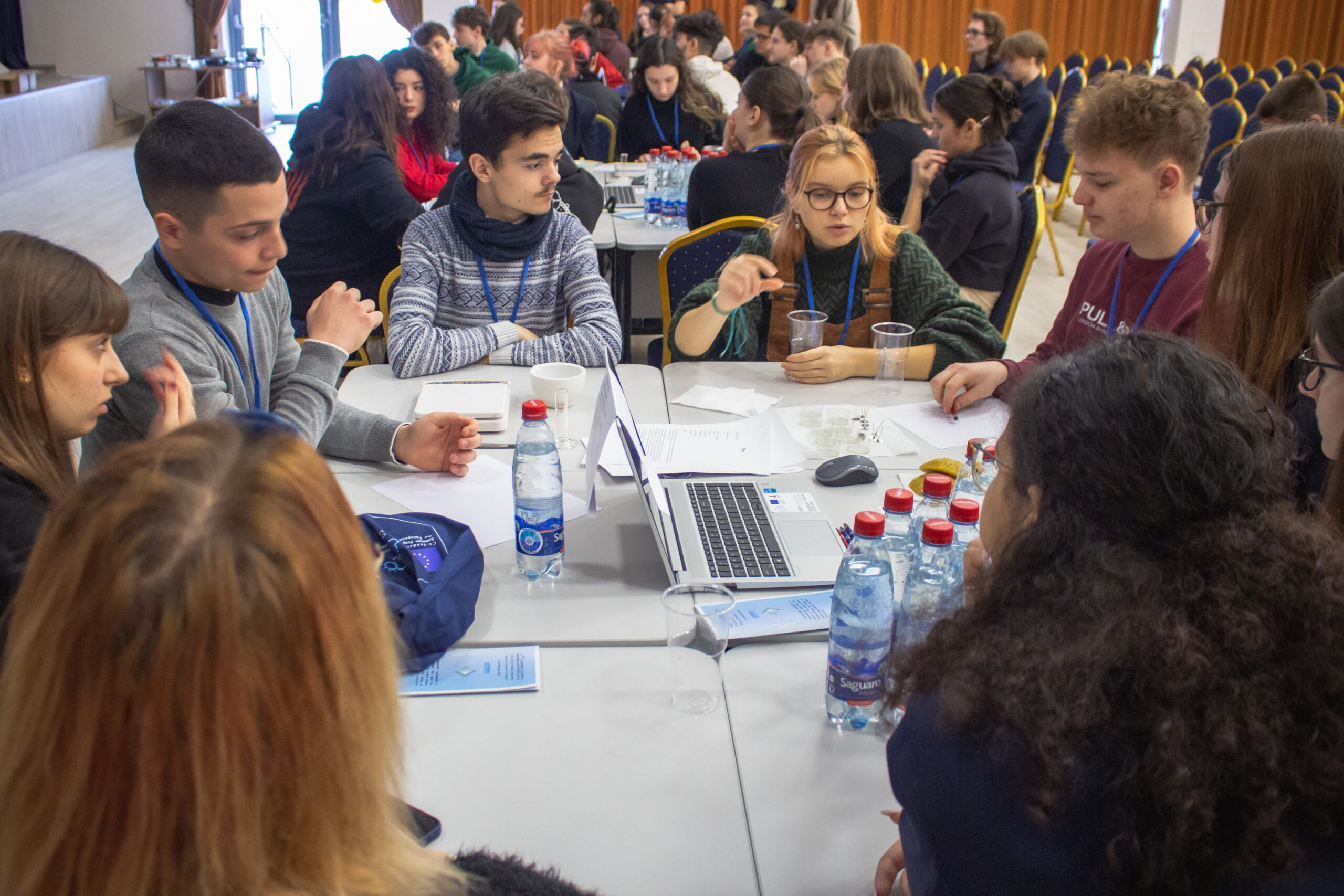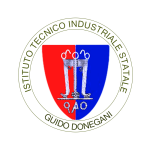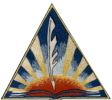From February 6-10, at Domeikavos Gymnasium, there were teaching and learning activities among partners of the Erasmus+ project CiELO. In Italian, “cielo” means “sky.” The project focuses on aspects of sustainable economic development, water and soil pollution issues. We aim to educate students on the responsible use of natural and man-made resources. As stated in the project concept, we think about “what is bigger than big, higher than high, and vital to us all.”
The project participants included students, teachers, scientific partners from the University of Zagreb, and project coordinators FEEM and Civicamente representatives. The director of Domeikavos Gymnasium, Dalius Vibrantis, welcomed the project participants and coordinator Ada Micpovilienė wished for effective work, new knowledge and experiences, and meaningful time in Lithuania. On the first day of the project meeting (LTTA), 37 students from Croatia, Italy, Romania, and Lithuania got to know each other by communicating in international teams. Representatives of the project coordinating organizations, FEEM and Civicamente, presented a program of learning activities for the week and the Canva software used to create problem-solving mind maps. Chemistry teacher Vygrė Čiužaitė invited everyone to an educational session on making aromatherapy candles, which applied knowledge of chemistry, mathematics, and English language. The seminar not only provided new experiences but also helped to make friends and experience the joy of communication. Teacher and doctor of bio-physical sciences Vilius Marma organized an inclusive lecture on material recycling, sustainability, and utilization, illustrated by examples of making and applying musical instruments from recycled materials.
The first day of the project ended with a cheerful evening featuring our school’s pride – the folk ensemble “Serbentėlė.”
On February 7th, the project participants, teachers, and students visited the Lithuanian Energy Institute. During the visit, they listened to presentations in English on research on materials, processes, and technologies related to the uptake of renewable energy resources, hydrogen energy, improvement of combustion devices, efficient use of energy resources, and reduction of environmental pollution. They also visited the Plasma Technologies, Combustion Processes Laboratories, and Hydrogen Energy Technology Center. In the laboratories, they learned about the research conducted and the Institute staff demonstrated how plasma equipment technology works. After returning to the gymnasium, the project participants listened to a lecture by Karolina Gurjazkaite, a doctoral student at the Lithuanian Energy Institute, entitled “LET IT FLOW: Returning life to rivers”. The young scientist and environmental activist interactively presented the dam network and the threats it poses to wildlife, possible solutions to problems, and an analysis of real cases. Karolina’s presentation received many questions from students and teachers. During practical activities, students discussed, created concept maps related to river pollution, and presented the results of their work in international workgroups.
On February 8th, the CiELO project team visited the Lithuanian University of Agriculture Academy. Academy scientists introduced their activities to the team. Docent Dr. Rimantas Vaisvalavicius and Dr. Edita Mazuolyte-Miskine spoke about the importance of soil quality for sustainable environmental development, while Doc. Dr. Povilas Mulerčikas presented the future of food – insects and their importance. Dr. Edita Meskinyte spoke about meat quality and the importance of genetics for the future, and lecturer Alvydas Žibas introduced aquaculture. In the afternoon session of the project meeting, FEEM representative Dr. Yulia Kiryakova presented how agricultural by-products can be reused in biological recycling companies. An international group of student workers developed and presented mind maps related to this topic. After completing the learning activities, we went on an active exploration of Kaunas. Students, along with their teacher Gyčius Bagdonavičius from Domeikavos Gymnasium, participated in the orienteering game “Actionbound,” project participants wandered through the rich history of Kaunas in the Art Deco Museum.
On February 9th, the CiELO team met with the team of researchers from Kaunas University of Technology (KTU). An interactive lecture was organized by the director of the Institute of Environmental Engineering, Professor Dr. Žaneta Stasiškienė, Doc. Dr. Inga Gurauskienė, Prof. Dr. Jolanta Dvarionienė, Doc. Dr. Daina Kliaugaitė. Lorenzo Piazzi, an interior designer, art and creative director, and founder of the international network “Design Library,” joined the meeting remotely. All speakers discussed topics closely related to the CiELO project, such as sustainable urban development, the importance of life cycle assessment, climate change and its impacts and threats. The unique project implemented in Kaunas, which preserves biological diversity, was presented. Participants visited the KTU design laboratory. During the final session, project participants listened to a presentation by Professor Lidija Hrnčević of the Faculty of Mining, Geology, and Petroleum Engineering at the University of Zagreb on complex deep purification of industrial wastewater from organic and inorganic impurities. Urban development, industrial and agricultural activities, and climate change pose a threat to drinking water resources, and its quality deteriorates due to the poor condition of wastewater treatment facilities and high concentrations of fertilizers used in agriculture. During the presentation, the professor discussed water treatment stages, processes, recycling, contamination and reuse, and water pollution prevention measures. After the lecture, students worked in groups, discussed the causes of water pollution typical for different regions of Europe, considered ways to improve water quality, and presented their findings using the graphic design tool Canva.
The last day of the project was dedicated to reflecting on what we learned and the impact the Erasmus+ learning week had on the different team from different countries. All experiences and summaries were recorded in articles and video material, and the further course and timelines of the project were discussed. We are steadily and consistently traveling on the path of learning and conscious environmental awareness. The project meeting ended in Birštonas, where we learned about the history of mineral water extraction, rested, and were inspired with the desire to change and make changes.

















